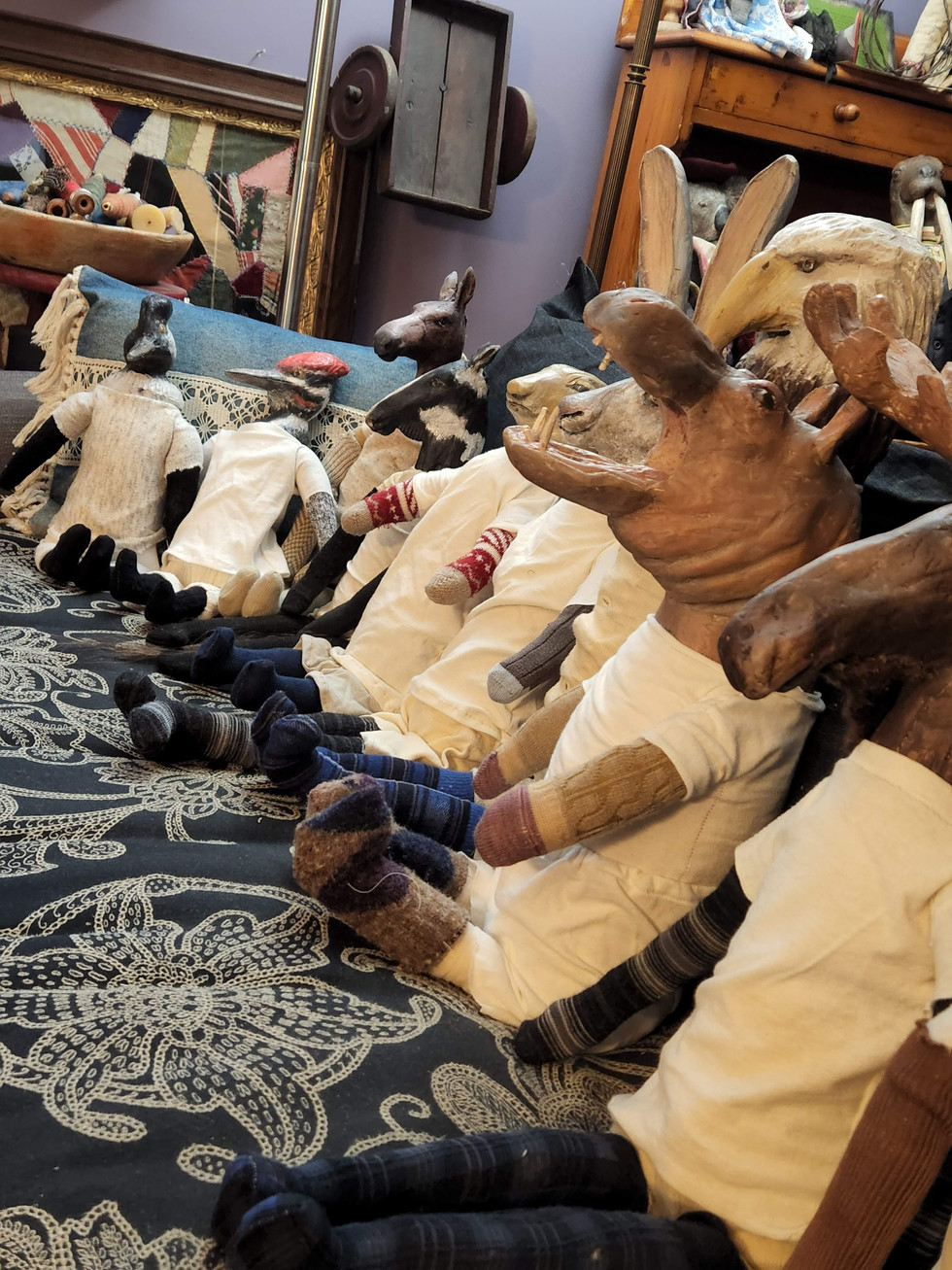"We and They"
- Andrea Durnell
- Sep 4, 2022
- 3 min read
Updated: Sep 16, 2022

Each year as my annual menagerie progresses, I identify one or two themes running through their developing stories. These themes represent things I have had on my mind while carving, painting, and designing their clothing. My mind, like my mouth, likes to run, and while I am held captive by a menagerie trying to find its way out of the wood, my thoughts organize into a general idea.
The first time I encountered this poem by Rudyard Kipling was in high school and it planted the seed that eventually led me to study abroad for a year in Tunisia in college. At some point after that, I read the poem again while I had a work-study job in International Education as I was considering joining the Peace Corps after I graduated. (Togo, West Africa became my temporary home) I had a wadded-up copy of it that I carried with me to jobs working in Study Abroad and university Admissions.
Over the years, its significance and meaning have adapted to a lot of other situations in life. Marrying someone not originally an American, there was often a question about differences and whether they were due to perspectives built from diverse upbringings or just male-female perspectives. While our daughter was growing up post 9-11, I used to take this poem to her elementary and junior high schools as part of a presentation I did for numerous classes on cross-cultural understanding.
I had forgotten about the poem until recently when my friend and author, Wende Dikec, wrote about me in the Beaver County Bulletin for a series she writes about people from Beaver County. Somehow I got sandwiched between articles on Henry Mancini and Rudyard Kipling, who was not from Beaver County, but who did have a connection. I found my placement between these two notables rather hilarious and it jogged my memory of that old, familiar poem.
Once again, this poem becomes applicable. Sadly, there is a feeling of "we and they" in almost every conversation anymore. I think the worst part of this is the lack of interest in understanding and accepting "them" and forgetting that all of us could strive to be "we". I think we all still do have common ground if we would simply be willing to see it.
In a diverse group of animals in my menagerie each year, I think my little animal kingdoms can symbolically represent a willingness to live together, cooperate and have some common goals.
Remember that Golden Rule we all grew up with? Do unto others as you would have them do unto you. Take it one step further. I have always thought of that rule as very self-centered because it presumes the other party is just like you. Why not go the extra mile and figure out how they are different and do unto them what they would like done? Do we really want a world where we have to all think and behave the same?? It takes all kinds to have progress, innovation, and harmony. You do you, but let others BE.
Here is Rudyard Kipling's poem, "We and They". Read it and think about "crossing over the way" to see into someone else's perspective. I have loved it for a long time! PEACE.
"Father and Mother, and Me,
Sister and Auntie say
All the people like us are We,
And everyone else is They.
And They live over the sea,
While We live over the way,
But would you believe it? --They look upon We
As only a sort of They!
We eat pork and beef
With cow-horn-handled knives.
They who gobble Their rice off a leaf,
Are horrified out of Their lives;
While they who live up a tree,
And feast on grubs and clay,
(Isn't it scandalous? ) look upon We
As a simply disgusting They!
We shoot birds with a gun.
They stick lions with spears.
Their full dress is un-.
We dress up to Our ears.
They like Their friends for tea.
We like Our friends to stay;
And, after all that, They look upon We
As an utterly ignorant They!
We eat kitcheny food.
We have doors that latch.
They drink milk or blood,
Under an open thatch.
We have Doctors to fee.
They have Wizards to pay.
And (impudent heathen!) They look upon We
As a quite impossible They!
All good people agree,
And all good people say,
All nice people, like Us, are We
And everyone else is They:
But if you cross over the sea,
Instead of over the way,
You may end by (think of it!) looking on We
As only a sort of They!"








